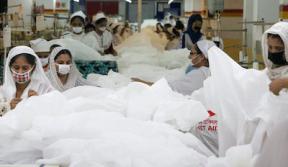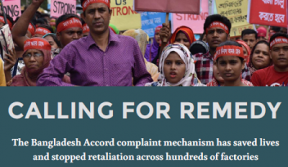More than one hundred workers died as a result of the garment factory fire that started on Saturday evening at Tazreen Fashions, owned by Tuba Group. Together with our partners in Bangladesh and around the world, ILRF is calling for an independent and transparent investigation into the causes of the fire; full and fair compensation to be paid to injured workers and to the families of the deceased; and effective action from all parties involved to prevent future tragedies.
In addition to finding evidence that the factory produced Walmart’s Faded Glory brand, researchers found over a dozen other brand logos on clothing and documents in the factory, including Ace, C&A, Dickies, Fashion Basics, Sean Combs Co.'s Enyce brand, Edinburgh Woollen Mill's brands P.G. field and Country Rose, Hippo, Infinity Woman, Karl Rieker GMBH & Co., Kebo Raw, Kik, Piaza Italia, Soffe, and True Desire.
For several years, the International Labor Rights Forum has been tracking and responding to factory fires in Bangladesh’s garment industry. This is the most deadly factory fire in the history of the apparel industry in Bangladesh, which is the world’s second largest apparel exporter after China. Export data has indicated that Walmart is the second largest buyer of garments from Bangladesh, after H&M.
First reports suggest the fire was started by an electrical short circuit. Faulty wiring is a common cause of factory fires in Bangladesh. According to fire department operations director, Maj. Mohammad Mahbub, the factory had no emergency exits. Workers unable to escape were burned alive. Others jumped to their deaths to escape the flames. The death toll continues to rise as rescue workers plow through the remains of the devastated factory.
According to ILRF research, since 2005 over 700 garment workers have died as a result of unsafe buildings in Bangladesh. The data indicate a trend that brands can no longer ignore. In March 2012, PVH Corp. (owner of Tommy Hilfiger, Calvin Klein, Van Heusen, IZOD, ARROW, G.H. Bass, and Eagle) signed an agreement with Bangladeshi unions, international unions, ILRF and other labor rights groups to develop a fire safety program to prevent future deaths in Bangladesh’s garment industry. The program includes independent inspections, public reporting, mandatory repairs and renovations, a central role for workers and unions in both oversight and implementation, supplier contracts with sufficient financing and adequate pricing, and a binding contract to make these commitments enforceable. German retailer Tchibo joined the agreement in September.
Other brands implicated in large, deadly factory fires in 2010 – including H&M, Gap, JCPenney, Target, Abercrombie, Kohl’s and Carter’s – have also been invited to join the agreement. “Unfortunately, Gap Inc. withdrew last month from fire safety discussions and instead announced their own non-binding program, which lacks central elements of the fire safety program signed by PVH and Tchibo,” said Judy Gearhart, executive director of International Labor Rights Forum. Gearhart added: “We hope the tragic fire at Tazreen will serve as an urgent call to action for all major brands that rely on Bangladesh’s low wages to make a profit. Their voluntary and confidential monitoring programs have failed; now it is time to come together and make a contractual commitment to workers and to involve workers and their organizations in the solution.”
November 27, 2012--
Statement by International Labor Rights Forum and Worker Rights Consortium:
Walmart’s constant downward price pressure prevents factories from being able to afford necessary safety precautions and its own supply chain auditing has failed to protect workers from being killed in deadly fires.
One factory producing Walmart’s Faded Glory clothing line, Tazreen Fashions, caught fire on November 24, 2012, killing 112 workers and injuring more than 200 workers in the deadliest factory fire ever in Bangladesh. According to Walmart, a supplier had subcontracted work to Tazreen Fashions without Walmart’s authorization. Regardless of whether Walmart acknowledges Tazreen as an approved supplier, Walmart is responsible for the safety of the workers making its clothing and should not abandon Tazreen and its employees following this disaster.
Walmart must now provide full and fair compensation covering loss of future earnings as well as damages to the families of the dead as well as to the injured workers. In addition, to minimize the risk of future factory fires, Walmart should join the comprehensive fire and building safety program with unions and labor rights groups that PVH (owner of Tommy Hilfiger and Calvin Klein) and German retailer Tchibo have already signed onto. The program includes independent inspections, public reporting, mandatory repairs and renovations, a central role for workers and unions in both oversight and implementation, supplier contracts with sufficient financing and adequate pricing, and a binding contract to make these commitments enforceable.
November 28, 2012--
December 2, 2012--
These are the measures that ILRF, together with our partner organizations representing consumers in North America and Europe and workers and their organizations in Bangladesh, are requesting of all retailers and brands sourcing from Tazreen:
1) Full redress for the victims
- Emergency relief for all victims and their families, including medical treatment.
- Coverage of all medical costs short and long term.
- Full and fair compensation covering loss of future earnings as well as damages for the injured and families of the dead, based on the compensation formula proposed by the unions and labor rights groups supporting the Bangladesh Fire and Building Safety Agreement. The full compensation package should also cover educational fees for the children of the deceased.
- Ensure wages continue to be paid for all workers (meeting legal entitlements at minimum) and that all workers are rehired at Tazreen Fashions, or in the event that it does not reopen, that workers are paid legal severance and offered priority hiring in nearby suppliers at equivalent or higher salary levels.
- Work with the government to set up a permanent workers’ welfare fund to cover compensation for industrial incidents and workplace injuries.
2) Full and transparent investigation
- Acknowledge responsibility and support an independent investigation into the fires and prosecution for those culpable.
- Publish all audit reports relating to Tazreen Fashions.
3) Prevention of future incidents
- Sign and immediately implement the comprehensive and independent Bangladesh Fire and Building Safety Agreement that has been developed by local and global unions and labor rights organizations. The program includes independent inspections, public reporting, mandatory repairs and renovations, a central role for workers and unions in both oversight and implementation, supplier contracts with sufficient financing and adequate pricing, and a binding contract to make these commitments enforceable.
- Publicly disclose full supplier list.
- Actively promote freedom of association and bargaining rights for workers through access agreements to create an atmosphere where workers can freely join trade unions and form factory level unions.
Brands sourcing from the Tazreen Fashions factory should send a delegation to Bangladesh to meet victims and their families, trade unions and labor rights organizations and work with other buyers to ensure these demands are met.

